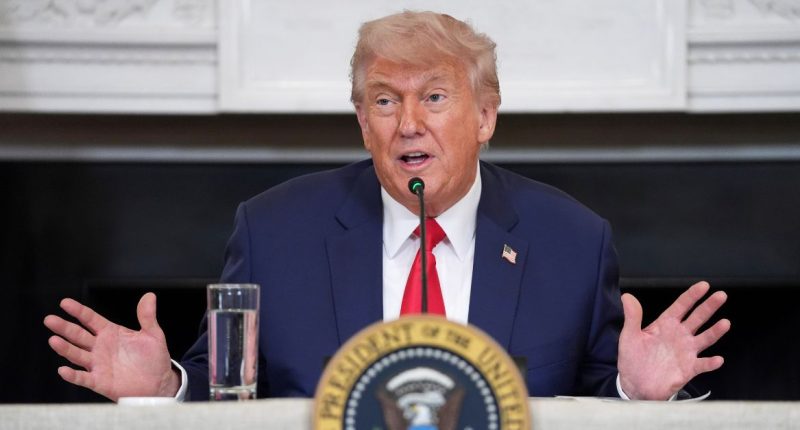Share this @internewscast.com
President Donald Trump is seen speaking at an “Invest in America” roundtable alongside business leaders at the White House on Monday, June 9, 2025, in Washington. (AP Photo/Evan Vucci)
Tariffs introduced by President Donald Trump can remain in effect for the time being following a decision by a federal appeals court to halt a lower court’s ruling, which had tried to block the tariffs, as the appeal proceeds.
The U.S. Circuit Court of Appeals for the Federal Circuit determined that it is “warranted” to maintain the stay — marking a victory for the Trump administration, which intends to utilize its extensive tariff strategy to realign global trade to benefit the U.S. Nonetheless, this triumph may be temporary, as the court has not yet delivered a verdict on the legality of the tariffs themselves.
While the U.S. Court of International Trade on May 28 ruled that the tariffs on nearly every other country were unlawful, the appeals court granted the administration’s request for an administrative stay the very next day. Eleven judges on the 12-member federal appellate court then considered further motions in the case over whether to extend the pause, resulting in Tuesday’s brief order.
Love true crime? Sign up for our newsletter, The Law&Crime Docket, to get the latest real-life crime stories delivered right to your inbox.
The judges scheduled oral arguments for July 31 — allowing the tariffs to remain in place until that date.
“The court also concludes that these cases present issues of exceptional importance warranting expedited en banc consideration of the merits in the first instance,” the judges wrote.
The plaintiffs in the case before the U.S. Circuit Court of Appeals for the Federal Circuit are a coalition of states led by Democrats and several businesses. They argued that Trump unlawfully and “arbitrarily” imposed the levies under an emergency statute without there being any actual emergency.
That statute was the International Emergency Economic Powers Act, which “provides the President broad authority to regulate a variety of economic transactions following a declaration of national emergency.” Trump’s invocation of the statute is similar to at least one other of his executive actions, in which he cited the Alien Enemies Act as legal support for a mass apprehension and deportation effort of people the administration says it suspects are illegal immigrant gang members.
Trump reacted to the court’s ruling on Wednesday morning by writing on his social media platform Truth Social: “A Federal Appeals Court has just ruled that the United States can use TARIFFS to protect itself against other countries. A great and important win for the U.S.”
However, the president incorrectly stated that the court ruled he “can use” the tariffs “to protect itself.” The court made no judgment; it only delayed its decision while it considers the merits of the case. And the appeals court’s ultimate ruling may not be the end of the case, as it may ultimately find its way to the U.S. Supreme Court.
A lawyer for the plaintiffs called Tuesday’s order “unfortunate.”
“All I can say is the court’s decision is unfortunate,” Ilya Somin, a law professor at Scalia Law School, George Mason University and plaintiff lawyer, wrote in an email to CNN. “The Federal Circuit also indicated in its ruling today that there will be expedited consideration of the case, and we hope to get a ruling on the merits faster than usual.”
The president has long lambasted what he sees as unfair trade practices against the U.S., with the principal culprit in his eyes being China. He has placed a 30% levy on the East Asian giant and at least a 10% levy on nearly every other country, announcing most of them in an early-April “Liberation Day” declaration. It is these tariffs that the plaintiffs challenged, though the president has enacted others, such as 25% tariffs on some imports from ally-neighbors Mexico and Canada as well.
While U.S. citizens have been split on whether they believe Trump’s tariffs will be effective, many experts have expressed fears over them prompting a recession.
















